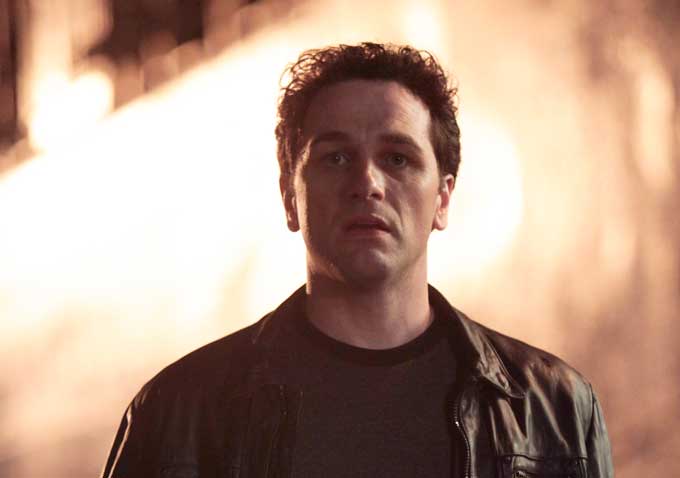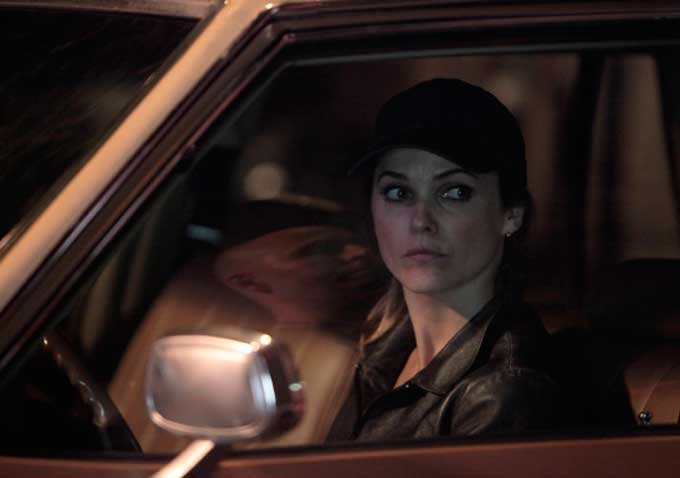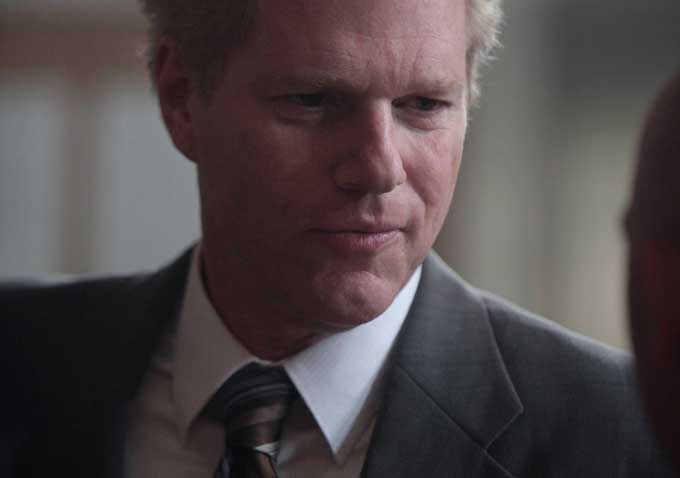By providing your information, you agree to our Terms of Use and our Privacy Policy. We use vendors that may also process your information to help provide our services. This site is protected by reCAPTCHA Enterprise and the Google Privacy Policy and Terms of Service apply.
‘The Americans’: An Immigrant Tale as Sexy Russian Spy Story

The article below contains spoilers for the January 30th pilot episode of “The Americans.”
“The Americans,” the giddily engaging new FX drama that premiered last night, has the most nostalgic of paranoid thriller premises. It’s 1981 in Washington, D.C., and Elizabeth (Keri Russell) and Phillip (Matthew Rhys) Jennings are KGB spies living among us — that is, undercover as a normal, brownie-baking American family. They run a travel agency and have two children, Henry (Keidrich Sellati) and Paige (Holly Taylor), who have no idea about their parents’ real identities. And they’re not just sleepers lying in wait — the pilot, written by creator (and ex-CIA agent) Joe Weisberg and directed by Gavin O’Connor (“Warrior”), kicks off with a scene of Elizabeth picking up a Department of Justice stooge at a bar and coaxing information out of him with sex and flattery. From here we segue into an action sequence set to Fleetwood Mac’s “Tusk” that finds her working with Phillip and another accomplice, using the details she garnered to kidnap a former fellow agent turned FBI informant.
 It is, as far as depictions of espionage go, more grounded than the likes of “Alias” while not exactly existing in the realm of the believable. The Jennings have managed to blend so perfectly into the fabric of American culture that they’ve even fooled their blissfully unaware native-born children, and they’re able to carry out dangerous missions on the side of an impeccably standard middle class existence. (Then again, a ring of Russian sleeper agents were arrested in the U.S. in 2010, several of them couples who’d passed themselves off, if not entirely convincingly, as Americans.) But it’s the tension between who the Jennings really are and who they claim to be that’s the most interesting aspect of “The Americans” — it’s a spy story, but it’s also an immigrant tale about assimilation and how much or how little you absorb from the place in which you live.
It is, as far as depictions of espionage go, more grounded than the likes of “Alias” while not exactly existing in the realm of the believable. The Jennings have managed to blend so perfectly into the fabric of American culture that they’ve even fooled their blissfully unaware native-born children, and they’re able to carry out dangerous missions on the side of an impeccably standard middle class existence. (Then again, a ring of Russian sleeper agents were arrested in the U.S. in 2010, several of them couples who’d passed themselves off, if not entirely convincingly, as Americans.) But it’s the tension between who the Jennings really are and who they claim to be that’s the most interesting aspect of “The Americans” — it’s a spy story, but it’s also an immigrant tale about assimilation and how much or how little you absorb from the place in which you live.
Elizabeth and Phillip were paired up by the KGB for their assignment, introduced and told never to talk about their past lives as a way to make keeping their covers easier, and then shipped off to the U.S. where they were never supposed to speak Russian again. They have a house and a period-appropriate Oldsmobile, they go out to ice cream, they don’t dwell on their former homeland. It’s an extreme version of adoptive citizenry in which the travelers arrive not to make new lives for themselves in an aspirational sense but to serve their country remotely. They’re spying for others, not working for themselves, but the tension in their relationship echoes that of any arrival struggling with how much of one’s old cultural heritage to hold on to, a sense of displacement that’s abetted by the ways in which Russell and Rhys are far more convincing as the present day Jennings than as their flashback Soviet selves.
 Elizabeth remains the hardline patriot — “I would lose everything before I would betray my country,” she snarls — but Phillip has started to feel like the life they’re pretending to lead is enough, that maybe they don’t have further obligations to the place from which they came. The man they kidnap and end up having to hold on to for awkward days, Nikolai Timoshev (David Vadim), presents the tempting offer that they could get millions of dollars for returning him to the FBI and turning informant like he did. They could be genuine, for real Americans, Phillip reflects, living large and no longer having to worry about following through on increasingly hazardous assignments.
Elizabeth remains the hardline patriot — “I would lose everything before I would betray my country,” she snarls — but Phillip has started to feel like the life they’re pretending to lead is enough, that maybe they don’t have further obligations to the place from which they came. The man they kidnap and end up having to hold on to for awkward days, Nikolai Timoshev (David Vadim), presents the tempting offer that they could get millions of dollars for returning him to the FBI and turning informant like he did. They could be genuine, for real Americans, Phillip reflects, living large and no longer having to worry about following through on increasingly hazardous assignments.
“The Americans” complicates the clash between its central characters by having their romance, like their place in the country, be both real and not real. They’re in an arranged marriage, they have espionage-mandated sex with other people, and they had children together as a way to keep up their identities. But they also genuinely care for each other and their offspring and are conflicted as to how they want the kids to grow up.
 Phillip enjoys America enough to be able to offer up a line dance after trying on cowboy boots in front of his horrified teenage daughter at the mall, but he also ends up tangling with a man who’s a quintessential homegrown meathead, one he later tracks down for harrassing his daughter and beats up while he’s in the backyard grilling hot dogs. Less enchanted with the materialism of the country, Elizabeth insists that the children “don’t have to be regular Americans,” that they could be socialists, but is all the more fierce about wanting to shelter them from the truth about their parents — if she could easily choose a life for them, it doesn’t seem like it’d be the one she had growing up in the U.S.S.R.
Phillip enjoys America enough to be able to offer up a line dance after trying on cowboy boots in front of his horrified teenage daughter at the mall, but he also ends up tangling with a man who’s a quintessential homegrown meathead, one he later tracks down for harrassing his daughter and beats up while he’s in the backyard grilling hot dogs. Less enchanted with the materialism of the country, Elizabeth insists that the children “don’t have to be regular Americans,” that they could be socialists, but is all the more fierce about wanting to shelter them from the truth about their parents — if she could easily choose a life for them, it doesn’t seem like it’d be the one she had growing up in the U.S.S.R.
By the pilot’s end, the Jennings affirm in various way that for the time being, their loyalty is to each other rather than the pull of either nation, with Phillip killing Timoshev, their potential leverage for defecting, after figuring out that the man once raped Elizabeth. Elizabeth, who reports without Phillip’s knowledge to a Russian general to whom she’s in the past revealed doubts about her husband, lies about his fidelity to the motherland. Things continue as they were, if more shakily than before, with the death of Timoshev bringing added attention to the operative ring of which the Jennings are a part.
 The couple comes together to have adrenaline-fueled sex in their car after disposing of Timoshev’s body in a scene set to “In the Air Tonight” that manages to be simultaneously horrendously cheesy and terrific. It’s the ’80s, the world feels like it could tumble into war, and the man and woman now known as Phillip and Elizabeth Jennings are in love, though they don’t really trust one another. And in a particularly clever touch, the main antagonist they’ve got to watch out for is the guy who just moved in next door, a pleasant, even-tempered family man named Stan (Noah Emmerich) who happens to be a competent undercover agent himself as well as an FBI agent. In some surburban stories, white picket fences hide dark secrets — in “The Americans,” they stand in front of ideological divides and suspicions, with everyone harboring an agenda underneath the careful surface.
The couple comes together to have adrenaline-fueled sex in their car after disposing of Timoshev’s body in a scene set to “In the Air Tonight” that manages to be simultaneously horrendously cheesy and terrific. It’s the ’80s, the world feels like it could tumble into war, and the man and woman now known as Phillip and Elizabeth Jennings are in love, though they don’t really trust one another. And in a particularly clever touch, the main antagonist they’ve got to watch out for is the guy who just moved in next door, a pleasant, even-tempered family man named Stan (Noah Emmerich) who happens to be a competent undercover agent himself as well as an FBI agent. In some surburban stories, white picket fences hide dark secrets — in “The Americans,” they stand in front of ideological divides and suspicions, with everyone harboring an agenda underneath the careful surface.
By providing your information, you agree to our Terms of Use and our Privacy Policy. We use vendors that may also process your information to help provide our services. This site is protected by reCAPTCHA Enterprise and the Google Privacy Policy and Terms of Service apply.

















